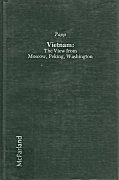PAPP : Vietnam (előszó)
"Vietnam" ... even today, Americans often react to the word with mixed feelings of failure, frustration, and guilt. For 25 years, from the time when the first 35-member U.S. Military Assistance Advisory Group arrived in Vietnam in August 1950 to the time when the last Marines were lifted by helicopter frorn the soon-to-be-captured U.S. Embassy in Saigon in April 1975, the United States attempted to create a viable noncommunist state in the Southeast Asian nation. For 25 years, that effort achieved less than the desired results, finally ending ignominiously with the rout of the Army of the Republic of Vietnam and the collapse of the South Vietnamese state.
During the years immediately after the fall of South Vietnam, Americans in general preferred to ignore and to forget the American experience there. Recently, however, new interest has developed about what lessons the U.S. should learn from its Vietnamese experience. To uncover these lessons, it is first necessary to understand how American policy-makers perceived the situation in Vietnam as they made the critical decisions which led to involvement.
At the same time, it is somewhat myopic to perceive only American lessons, and incompletely useful to analyze only U.S. perceptions. The United States' involvement in Vietnam took place in a broader global context, and carried with it lessons for other nations as well – in particular the Soviet Union and the People's Republic of China. Given the major differences in worldview existing between these nations, it is reasonable to assume that the lessons they learned about the Vietnamese War may be considerably different from those learned by the United States. This observation has immediate relevance for the world today since in many cases, it is not too much to say that the lessons which the U.S.S.R. and the P.R.C. learned influence their current policies as much as the lessons the U.S. learned influence its current policies.
This book, then, compares American, Soviet, and Chinese perceptions of the Vietnamese War and contrasts the lessons each country learned, and continues to learn, from the U. S. involvement in it. It is hoped as well that it will contribute to the ongoing discussion of what in fact the United States should conclude – and what conclusions it should not draw – from the unhappy experience.
|
|

|
|
| KATALÓGUS | TARTALOM |